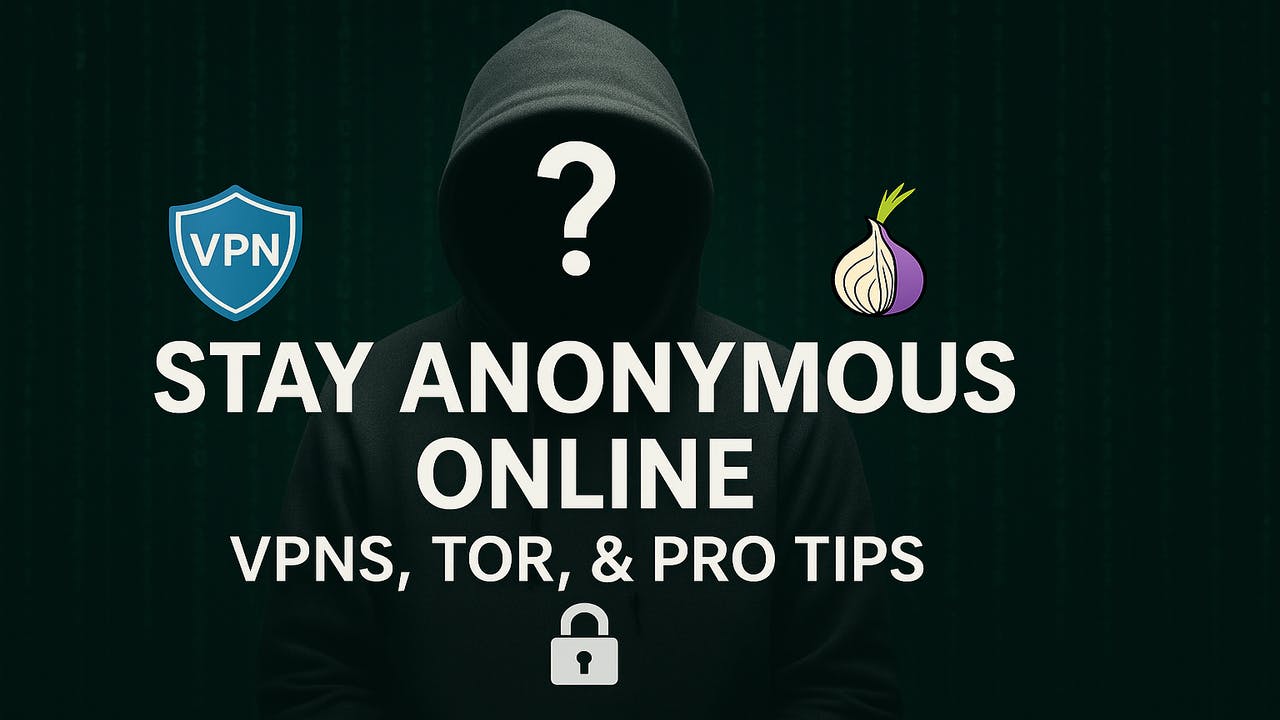Our every step online can be traced—by websites, advertisers, governments, and even cyber hackers. If you care about privacy, need to access blocked content, or simply enjoy the concept of being invisible online, it's time to learn how to remain anonymous. This blog will take you through the fundamentals of online anonymity and introduce you to tools such as VPNs, Tor, and more—described in a way that makes sense.
Prefer watching instead of reading? Here’s a quick video guide
https://youtu.be/I3EN4oowN04?embedable=true
Why Online Anonymity Matters
Each time you get online, your device reveals some information such as:
- IP address (your online address)
- Location
- Device and browser details
- Sites you visit
- Search terms
This information is gathered by ISPs (Internet Service Providers), websites, apps, advertisers, and even hackers at times. If you're not cautious, it can be used to:
- Construct detailed profiles about you
- Target you with advertisements
- Track your behavior
- Censor your access to content
- Track your identity or location
If you’re someone who values freedom, privacy, and security, online anonymity is worth considering.
Use a VPN (Virtual Private Network)
A VPN hides your real IP address by routing your internet traffic through a secure server in a different location. To anyone watching, it looks like you’re accessing the internet from the VPN server—not your real device.
How it helps:
- Masks your IP address
- Encrypts your data (even from your ISP)
- Bypasses geo-blocks (access content from other countries)
- Prevents websites from tracking your location
How to use it:
- Choose a good VPN provider (e.g., NordVPN, ExpressVPN, ProtonVPN)
- Download and install the app
- Choose a server location
- Connect and browse securely
Tip: Don't use free VPNs—they sell your data or have poor security.
Browse with Tor (The Onion Router)
Tor is a unique web browser that redirects your internet traffic through several random servers worldwide before it arrives at its destination. This makes it very difficult for anyone to track your activity.
How it helps:
- Strong anonymity
- Stops tracking
- Access to the dark web (use caution)
- Suitable for whistleblowers, journalists, and privacy enthusiasts
How to use it:
- Go to https://www.torproject.org
- Download the Tor browser (free)
- Open it like any browser and begin surfing
Note: Tor may be slower because of the multiple relays. It's not perfect for streaming or large downloads.
Private Search Engines
Each time you search on Google, your searches are recorded and linked to your identity. To search anonymously:
Use:
- DuckDuckGo – No tracking, no ads tailored just for you
- Startpage – Provides Google results without logging your data
- Brave Search – Privacy-centered and open
These search engines don't record your search history or observe what you click.
Disable Tracking in Your Browser
Most browsers monitor your activity and provide it to third parties. You can restrict this by:
Switching to Privacy-Focused Browsers:
- Brave – Blocks ads and trackers by default
- Firefox (with privacy settings turned up to the highest level)
- Tor Browser – Highest level of anonymity
Use Browser Extensions:
- uBlock Origin – Ad and tracker blocker
- Privacy Badger – Stops invisible trackers
- HTTPS Everywhere – Compels websites to use secure connections
Be Clever About Cookies and Logins
Cookies keep information about you. To minimize their effect:
- Clear cookies frequently
- Disable third-party cookies in browser options
- Use private/incognito mode for sensitive use
Logins: Do not log in to personal accounts (such as Google or Facebook) when attempting to remain anonymous. By logging in, your actions are traced back to your true identity.
Use Anonymous Email Services
Don't use your personal email to sign up with services you don't completely trust.
Try:
- ProtonMail – Anonymous and encrypted
- Tutanota – Secure email alternative
- SimpleLogin or AnonAddy – Create email aliases to mask your actual address
Pay Anonymously using Cryptocurrency
Using your credit card to pay online betrays your identity. If anonymity matters, consider:
- Bitcoin (only if you use it responsibly)
- Monero – Privacy-centric
- Privacy wallets (such as Wasabi Wallet for Bitcoin)
Note: Be cautious—if you cash out crypto without caution, you can still be tracked.
Don't Use Real Names and Photos
Anonymity online also relies on what you post. Don't use:
- A real name on anonymous profiles
- Reverse-searchable real photos
- Real personal info such as address, school, or workplace
Use avatars, nicknames, and maintain separation between your online self and offline identity.
Use Encrypted Messaging Apps
Well-known messaging apps such as WhatsApp or Messenger can store your metadata (with whom you communicate, when, where).
Instead, try:
- Signal – End-to-end encryption, minimal data collection
- Session – No phone number needed
- Threema – Paid, but highly secure
These applications value your privacy above surveillance or ads.
Bonus: Layer Tools for Maximum Privacy
No single tool will make you 100% anonymous. The most effective approach is layering tools:
- Use Tor + VPN for double protection
- Mix private search engines with privacy browsers
- Employ anonymous email when signing up for accounts
Imagine wearing a disguise with gloves, a mask, and a different pair of shoes—you want to leave no trace.
Final Thoughts
Being anonymous online doesn't indicate that you are hiding something. It indicates you are taking command of your online footprint. When your data is currency, your privacy is power.
If you're a privacy fan, a journalist, or simply a regular user tired of ads and trackers—these resources can make you anonymous, secure, and in command.


